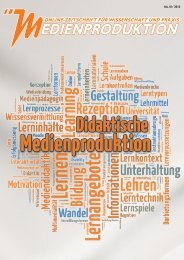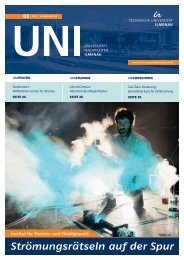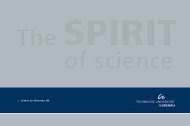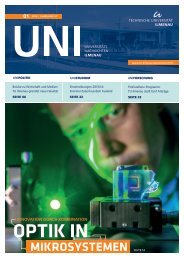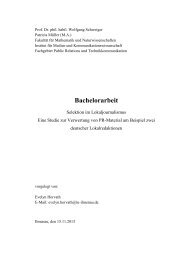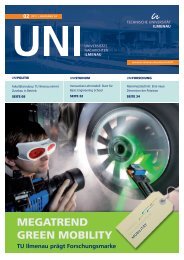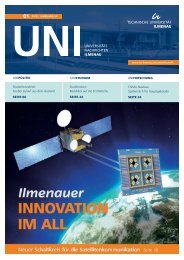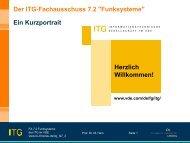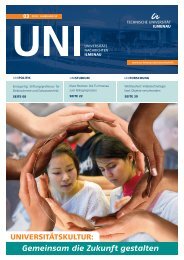University of Applied Sciences
University of Applied Sciences
University of Applied Sciences
Create successful ePaper yourself
Turn your PDF publications into a flip-book with our unique Google optimized e-Paper software.
Diploma Supplement <strong>of</strong> the Aachen <strong>University</strong> <strong>of</strong> <strong>Applied</strong> <strong>Sciences</strong> Page 3 <strong>of</strong> 5<br />
8. INFORMATION ON THE GERMAN<br />
HIGHER EDUCATION SYSTEM 1<br />
8.1. Types <strong>of</strong> Institutions and Institutional Control<br />
Higher education (HE) studies in Germany are <strong>of</strong>fered at<br />
three types <strong>of</strong> Hochschulen 2 :<br />
- Universitäten (Universities), including various specialized<br />
institutions, comprise the whole range <strong>of</strong> academic<br />
disciplines. In the German tradition, universities<br />
are also institutional foci <strong>of</strong>, in particular, basic research,<br />
so that advanced stages <strong>of</strong> study have strong<br />
theoretical orientations and research-oriented components.<br />
- Fachhochschulen (Universities <strong>of</strong> <strong>Applied</strong> <strong>Sciences</strong>)<br />
concentrate on engineering and other technical disciplines,<br />
business-related studies, social work, and design<br />
areas. Research and development are mostly<br />
application-oriented. Thus a distinct applicationoriented<br />
focus and pr<strong>of</strong>essional character <strong>of</strong> studies is<br />
implied.<br />
- Kunst- and Musikhochschulen (Colleges <strong>of</strong> Art/Music,<br />
etc.) <strong>of</strong>fer graduate studies for artistic careers in fine<br />
arts, performing arts and music; in such fields as directing,<br />
production, writing in theatre, film, and other<br />
media; and in a variety <strong>of</strong> design areas, architecture,<br />
media and communication.<br />
HE institutions are either state or state-recognized institutions.<br />
In their operations, including the organization <strong>of</strong><br />
studies and the designation and award <strong>of</strong> degrees, they<br />
are both subject to HE legislation.<br />
8.2 Types <strong>of</strong> programs and degrees awarded<br />
- In 1998, a new scheme <strong>of</strong> first- and second-level<br />
degree programs (Bakkalaureus/Bachelor and Magister/Master)<br />
was introduced. The European Community<br />
member states agreed on the common structure<br />
in order to enhance variety, flexibility and international<br />
compatibility.<br />
- Studies in all three types <strong>of</strong> institutions are traditionally<br />
<strong>of</strong>fered in integrated "long" (one-tier) programs<br />
leading to Diplom- or Magister Artium degrees or<br />
completion by a Staatsprüfung (State Examination).<br />
These “long” programs can be <strong>of</strong>fered parallel to or<br />
instead <strong>of</strong> Bachelor/Master programs.<br />
1 The information covers only aspects directly relevant<br />
to purposes <strong>of</strong> the Diploma Supplement.<br />
All information as <strong>of</strong> 1 Jan 2000 .<br />
2 Hochschule is the generic term for higher education<br />
institutions.<br />
- For details cf. Sec. 8.41 and Sec. 8.42., respectively.<br />
Table 1 provides a synoptic summary.<br />
8.3 Approval/Accreditation <strong>of</strong> Programs and Degrees<br />
To ensure quality and comparability <strong>of</strong> qualifications, the<br />
organization <strong>of</strong> studies and general degree requirements<br />
have to conform to principles and regulations jointly<br />
established by the Standing Conference <strong>of</strong> Ministers <strong>of</strong><br />
Education and Cultural Affairs <strong>of</strong> the Länder in the Federal<br />
Republic <strong>of</strong> Germany (KMK) and the Association <strong>of</strong><br />
Universities and Other Higher Education Institutions in<br />
Germany (HRK). In 1999, a system <strong>of</strong> accreditation for<br />
programs <strong>of</strong> study has become operational under the<br />
control <strong>of</strong> an Accreditation Council at national level.<br />
Programs and qualifications accredited under this<br />
scheme are designated accordingly in the Diploma Supplement.<br />
8.4 Organization <strong>of</strong> Studies<br />
8.41 First/Second Degree Programs (Two-tier): Bakkalaureus/Bachelor<br />
and Magister/Master degrees<br />
These programs apply to all three types <strong>of</strong> institutions.<br />
Their organization makes use <strong>of</strong> ECTS and modular<br />
components. First degree programs (3 to 4 years) lead to<br />
Bakkalaureus/Bachelor degrees (B.A., B.Sc.). Graduate<br />
second degree programs (1 to 2 years) lead to Magister/Master<br />
degrees (M.A., M.Sc.). Both may be awarded<br />
in dedicated form to indicate particular specializations or<br />
applied/pr<strong>of</strong>essional orientations (B./M. <strong>of</strong> ... ; B.A., B.Sc.<br />
or M.A., M.Sc. in ... ). All degrees include a thesis requirement.<br />
8.42 Integrated "Long" Programs (One-Tier): Diplom<br />
degrees, Magister Artium, Staats-prüfung<br />
These traditional studies are either mono-disciplinary<br />
(single subject, Diplom degrees, most programs completed<br />
by a Staatsprüfung) or comprise a combination <strong>of</strong><br />
either two major or one major and two minor fields (Magister<br />
Artium ). As common characteristics, in the absence<br />
<strong>of</strong> intermediate (first-level) degrees, studies are divided<br />
into two stages. The first stage (1.5 to 2 years) focuses -<br />
without any components <strong>of</strong> general education - on broad<br />
orientations and foundations <strong>of</strong> the field(s) <strong>of</strong> study including<br />
propaedeutical subjects. An Intermediate Examination<br />
(Diplom-Vorprüfung for Diplom degrees;<br />
Zwischenprüfung or credit requirements for the M.A.) is<br />
prerequisite to enter the second stage <strong>of</strong> advanced studies<br />
and specializations. Degree requirements always<br />
3



